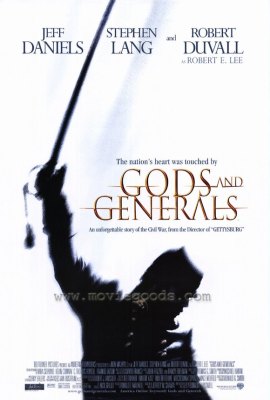| Reviews & Columns |
|
Reviews DVD TV on DVD Blu-ray 4K UHD International DVDs In Theaters Reviews by Studio Video Games Features Collector Series DVDs Easter Egg Database Interviews DVD Talk Radio Feature Articles Columns Anime Talk DVD Savant Horror DVDs The M.O.D. Squad Art House HD Talk Silent DVD
|
DVD Talk Forum |
|
|
| Resources |
|
DVD Price Search Customer Service #'s RCE Info Links |
|
Columns
|
|
|
Gods and Generals (HD DVD)
A monumentally bad Civil War epic executive produced by Ted Turner, Gods and Generals (2003) is so stupefyingly misguided as to join the ranks of other expensive, misbegotten pet projects like Inchon! (1980). The film would be a high-kickin' delight of high camp hilarity if it weren't three hours and thirty-nine minutes long, a running time just shy of Turner's beloved Gone with the Wind, which this in some ways emulates. In all fairness, Gods and Generals wasn't made for Yankees like this (Michigan-born) reviewer: it's a film for hard-core Civil War buffs and southerners with a Margaret Mitchell-imagined nostalgia for the Confederacy, a world of pious Kentucky Colonels and doting Aunt Jemimas.
On the other hand, films about of the Civil War and what life was really like for Americans living in the middle of the 19th century have become a rarity; interest about the period among moviegoers seems to have dried up, which is a shame. I went into the film with some optimism; though definitely not an authority on the subject, like millions of others I found Ken Burns' PBS documentary totally engrossing, and was hoping for something like Matthew Brady's famous photographs brought to life. What Gods and Generals amounts to is a propaganda film made 138 years too late. Sergei Bondarchuk's Soviet-produced War and Peace, by comparison, is less a polemic and vastly more intimate.
The film is essentially a prequel to the Turner-produced Gettysburg (1993), which relied heavily on Michael Shaara's Pulitzer Prize-winning historical novel The Killer Angels as a key source. Gods and Generals is adapted from the same-named novel written by Shaara's son, Jeffrey. As with the somewhat better Gettysburg, the film's focus is on a handful of officers idealized in the Leni Riefenstahl manner, particularly Lt. General Thomas "Stonewall" Jackson (Stephen Lang), overseeing battle reenactments whose minute details are doubtlessly meticulously researched and historically accurate. This kind of thing may delight Civil War buffs in the audience (one can almost see them nodding their heads in the dark with silent approval) but the battle scenes and particularly the strategies of the Union and Confederate Armies are going to be lost on most viewers because director Ronald F. Maxwell does a poor job setting up these conflicts. Compare this to, say, Kurosawa's Seven Samurai, which so carefully establishes the surrounding geography and strategies of its swordsmen that when the chaotic battles commence one always understands exactly what's happening onscreen. Moreover, the battles in Gods and Generals are notably sanitized - not bloodless, mind you, but rebs drop like so many tin soldiers in some rich man's game room.
Even many of Gettysburg's fans criticized Gods and Generals for the changes it made, mostly deletions (but also a painfully politically-correct addition, a rebuttal on slavery by Jeff Daniels, reprising his role from Gettysburg), in adapting Shaara's book. Most notably the first-third of the book details the events leading up to the outbreak of the war, but nearly all of this material has been excised. A six-hour "director's cut" supposedly exists, and an obscene amount of material was shot that Turner and others certainly must have known would never make it into a theatrical version.
I've never seen anything quite like Gods and Generals, except to some degree its predecessor. Every single moment is treated with biblical importance: a prayer delivered on the eve of battle, a dying soldier's last words on the battlefield, an extra sipping a glass of water.
Nothing in it remotely approaches the way real people speak; it's closer to 17th century English theater than anything in cinema. No one merely talks; absolutely everyone makes a big-winded speech that absurdly romanticizes The South as the great Christian Paradise. No one has any doubt about the rightness of the cause, nobody's cowardly or uncertain. Even the tiny percentage of blacks (there are exactly two speaking parts) in the film positively ooze with unbridled admiration for their white masters.
Of course, ending slavery was not the primary goal of the Union, so to complain that the film doesn't focus on the issue more would be beside the point had the filmmakers not raised it on their own. But beyond the disproportionately tiny number of blacks seen in the film, the filmmakers seem to agree with the position of apologists southerners like slave-owner Jackson, who in essence wonders what all the fuss is about? Slavery, he argues, will soon die a natural death anyway. This, I guess, implies that Jackson was gifted with the foresight of combustive-engine farm equipment, or something. The real Jackson reportedly believed slavery was imposed by God and thus did not oppose it (!). And this, friends, is the brilliant hero of our picture.
Everything is shot in the tableaux style of early-'20s silent cinema, and accompanied by a never-resting score that strongly resembles the kind of thing written to accompany silent movies. All is obscenely beautified; uniforms are spotless, and the filmmakers seem reluctant to smudge them with dirt or blood. Landscapes and establishing shots of 19th century American cities are similarly idealized, depicted in very 1950s CinemaScope-style matte paintings that are unfailingly picturesque. At times the film strongly resembles the kind of elaborate dioramas one finds in musty Civil War museums.
The acting is, in a word, appalling, though I don't know how anyone could deliver such stilted dialogue any other way. Almost to his credit Lang goes for broke, committing to a style that went out with Sir Donald Wolfit. Conversely, Robert Duvall is embarrassingly bad as a mumbling, waxworks Robert E. Lee.
Video & Audio
At least the HD DVD of Gods and Generals looks great. Filmed in Panavision, the (too) bright and colorful cinematography complements the high-def (1080p / VC-1) format. The 2.35:1 image throughout offers a splendid and subtle array of hues, though the image varies from extreme, impressive sharpness to, at times, moments where the image leans a bit on the soft side.
The Dolby Digital-Plus 5.1 mix is robust during the battle scenes, much less so for interiors, whose scenes are mixed more along the lines of a TV movie. Optional English, Spanish, and French subtitles are included.
(Incidentally, the 12-minute intermission, consisting of an entire reel of black film in its theatrical run, is not included.)
Extra Features
Gods and Generals is a flipper disc, with 480i/p standard definition supplements on Side B, though the introduction by Ted Turner and audio commentary by director/screenwriter Ronald F. Maxwell and historical advisors Col. Keith Gibson and James I. Robertson, Jr. accompany the feature. The commentary is the type with long stretches of dead air, and like a lot of Warner discs cries out for a moderator to step in and fill the gaps with pointed, scene-specific questions.
The standard-def extras include three featurettes: Journey to the Past: The African-American Slave Experience in the Film's Era (penance perhaps, to the movie's slavery-apologist tone), The Life of Thomas "Stonewall" Jackson, and The Authenticities of the Film. Also included are two music videos: Bob Dylan's "Cross the Green Mountain" and Mary Fahl's "Going Home." A trailer is also included, along with DVD-ROM features including a quiz, production photos, and a historical timeline.
Parting Thoughts
Except for Civil War buffs and southerners who prefer to look back on their history through rose-colored glasses, audiences will find Gods and Generals a monumental test of endurance. And even fans of the film, and there are a few ardent ones, will probably prefer to wait for a longer cut of the film that may in some respects be an improvement. I'll let one of my colleagues tackle that one, however. Skip It.
Film historian Stuart Galbraith IV's most recent essays appear in Criterion's three-disc Seven Samurai DVD and BCI Eclipse's The Quiet Duel. His audio commentary for Invasion of Astro Monster is now available.
|
| Popular Reviews |
| Sponsored Links |
|
|
| Sponsored Links |
|
|
| Release List | Reviews | Shop | Newsletter | Forum | DVD Giveaways | Blu-Ray | Advertise |
|
Copyright 2024 DVDTalk.com All Rights Reserved. Legal Info, Privacy Policy, Terms of Use,
Manage Preferences,
Your Privacy Choices | |||||||















